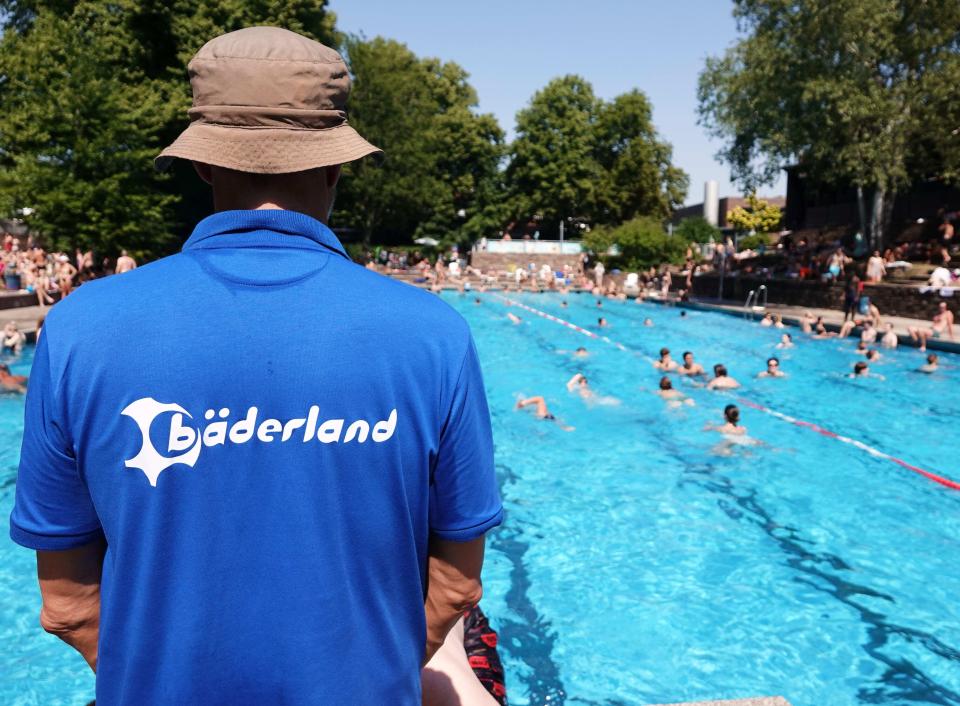GERMAN swimming pools have started to evict parents who are too distracted and always on their phones with near-fatal drowning cases soaring in the country.
A string of public pools under the Hamburg Bäderland ownership have all implemented the tough stance on screen addicts after labelling some adults “simply ignorant” and unaware of the dangers.
AlamyA string of public pools under the Hamburg Bäderland have started to evict parents who are too distracted on their phones[/caption]
GettyThe policy allows staff to kick out parents after one verbal warning about putting down their phones and keeping an eye on their children[/caption]
AlamyBäderland have implemented the ruling across 25 of their pools[/caption]
The new policy allows staff to kick out parents and guardians after one verbal warning about putting down their phones and keeping an eye on their children.
It comes as a concerning spike in the number of youngsters having to be rescued from the water has been recorded in the past 12 months.
Bäderland spokesman Michael Dietel said: “The problem is getting worse.
“The mobile phone is one factor but there are other distractions too. Some parents are also simply ignorant.
“In the past we’ve warned guests three or four times, but we’re less tolerant now.
“We’ve had cases where we’ve saved the child, resuscitated them, the ambulance and emergency doctor are already on site and then at some point the parent comes along because they’ve finished their call or were somewhere else in the building.”
The move comes after the Bäderland group already attempted to reason with the distracted dads and unfazed mums.
Flyers had been distributed around the pools asking parents to put their phones away.
Mr Dietel says the measures did little to stop children being in harm’s way.
In the past two weeks alone, a pair of six-year-olds were minutes away from tragically drowning before they were saved by lifeguards.
Both were resuscitated by pools in Hamburg with Mr Dietel telling The Times both were caused by distracted parents.
Children are often left wandering off on their own around the pools after not getting attention from their parents, he added.
This can put them in dangerous positions such as running along the edges which can lead to them falling over or worse slipping into the water.
The spokesman continued: “We very often get children running along the edge of the pool calling for their parents.
“Then our lifeguards have to take them by the hand and go looking for mummy and daddy.
“It puts us in a quandary because it takes us away from overall supervision of the pool which involves paying attention to the elderly swimmer doing his lengths who may get a heart attack.”
Germany has also been plagued with beach related horrors in recent years for similar reasons.
The German Life Saving Association (DLRG), which monitor more than 100 family beaches in the summer, say they recorded 1,200 cases in 2023 where children went missing.
Their research also uncovered a worrying number of children under the age of 10 drowning with 16 tragic cases being found last year.
In total 378 people drowned in Germany in 2023 according to DLRG figures – up from only 355 in 2022.
DLRG spokesman Martin Holzhause also placed some of the blame and inattentive guardians and their phone habits.
He said: “It usually happens because parents aren’t paying attention, and phones have been a big factor in that for years.
“Our lifeguards tell parents to take more care when they reunite them with lost children.”
Screen addiction
Screen addiction is a serious issue across the world with millions of us seemingly glued to our phones, laptops or TVs.
The term is most commonly used to described someone who is compulsively addicted to their devices to the point where it impairs their daily functioning.
It can often affect productivity, relationships, health and wellbeing.
It can also lead to some serious health issues.
Taking calls for as little as 30 minutes a week can raise your chances of developing high blood pressure by 12 per cent, a study at China’s Southern Medical University found.
Four hours a week may increase that danger by 16 per cent, and six hours by 25 per cent.
If you are a non-stop swiper or cannot refrain from texting and have pain in your fingers, this may be a condition known as Tinder Finger, or Texting Thumb.
This can lead to long-term complications such as tendinitis.
Another issue from increased screen time is how it can affect your eyes such as macular degeneration – when the centre of the retina, the macula, deteriorates and vision is distorted or lost.
Being glued to your phone increases the risk of obesity by 43 per cent, cardio-vascular trouble and even death, say researchers in Colombia from the Simon Bolivar University.

